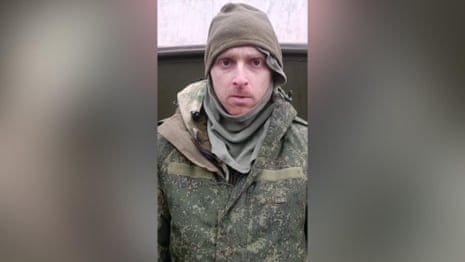Australia’s Ukrainian community is urging the Albanese government to intervene to have captured soldier Oscar Jenkins included in planned prisoner swaps, warning he risks becoming a “forgotten” prisoner of Russia’s war.
Jenkins, a 33-year-old former teacher and Australian citizen, travelled to Ukraine and enlisted to fight with the country’s military following Russia’s 2022 invasion. After being captured by Russian forces in December 2024, he was jailed for 13 years on the charge of being a “mercenary”.
Jenkins appeared in a video shared in December by a Russian military blogger showing him being roughly interrogated and hit.
The Australian Ukrainian Congress (AUC) community group urged the government and Ukraine’s ambassador to Australia, Vasyl Myroshnychenko, to take action through a contact group for prisoner swap negotiations, established with the government of Turkey.
Sign up: AU Breaking News email
Earlier this year, groups of prisoners from both sides of the conflict were released following high-level talks in Istanbul. Russia and Ukraine agreed to a phased exchange of prisoners, as well as the return of killed soldiers’ remains.
Ukrainian media reported in June that at least one more round of prisoner exchanges was expected in the near future as part of the agreement.
But Russia and its proxies treat foreigners who travel to fight in Ukraine as mercenaries, allowing them to be prosecuted under the criminal code and not afforded rights under the Geneva conventions.
The Department of Foreign Affairs and Trade summoned the Russian ambassador to Canberra in January to seek information on Jenkins, who had been believed to be dead. Weeks later, the foreign affairs minister, Penny Wong, announced that Russia had confirmed Jenkins was alive. An unverified video several weeks after appeared to show him alive, though weak and with a serious injury.
 Unverified footage appears to show Australian Oscar Jenkins alive in Russian captivity – video
Unverified footage appears to show Australian Oscar Jenkins alive in Russian captivity – video
Months after his capture, Andrew Olexander, a spokesperson for the AUC, said attention on Jenkins’ case was receding.
“We don’t want him to become Australia’s forgotten PoW,” Olexander told Guardian Australia.
Olexander said Wong should push for Jenkins’ priority inclusion in the ongoing prisoner swaps program through representations to the Russian government. He welcomed Wong’s acknowledgment that Jenkins was a serving member of Ukraine’s armed forces and should therefore be considered a prisoner of war.
“Claiming that he is a mercenary is just a word game so that Russia can send a warning to other foreign soldiers who might want to join Ukraine’s fight for freedom,” Olexander said.
Wong has accused Russia of running “sham trial” to imprison Jenkins and called for him to be treated humanely by authorities.
skip past newsletter promotion
Sign up to Breaking News Australia
Get the most important news as it breaks
Privacy Notice: Newsletters may contain information about charities, online ads, and content funded by outside parties. If you do not have an account, we will create a guest account for you on theguardian.com to send you this newsletter. You can complete full registration at any time. For more information about how we use your data see our Privacy Policy. We use Google reCaptcha to protect our website and the Google Privacy Policy and Terms of Service apply.
after newsletter promotion
A spokesperson for the foreign affairs minister told Guardian Australia the federal government was advocating for Jenkins’ release and was working with the International Committee of the Red Cross to make representations.
“Australia is appalled at the sham trial and sentencing of Oscar Jenkins by an illegitimate authority in the temporarily occupied region of Luhansk,” she said.
“As a full serving member of the regular armed forces of Ukraine, Mr Jenkins is a prisoner of war.
“We have consistently requested Ukraine prioritise Mr Jenkins’ release in future PoW swaps with Russia, and we continue to do so.”
Wong has restated Australia’s expectation that Russia must comply with its obligations under international humanitarian law, including with respect to prisoners caught on the battlefield.
“Australia is working with Ukraine and the International Committee of the Red Cross to advocate for Mr Jenkins’ welfare,” Wong’s spokesperson said.
“We want to see Mr Jenkins brought home.”
At least seven Australians are believed to have died fighting in Ukraine since Russia’s full-scale invasion began, but Jenkins is believed to be the first to be captured and held as a prisoner of war.

